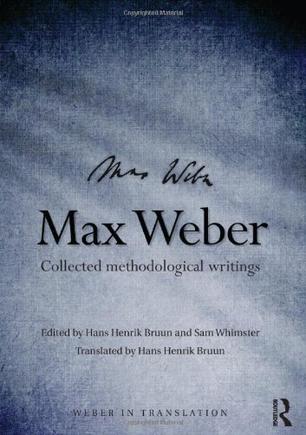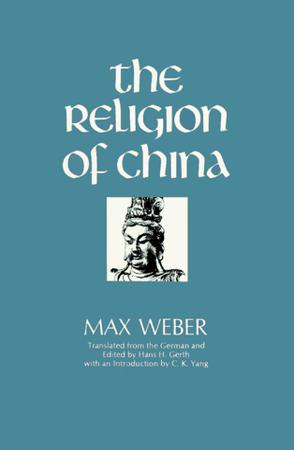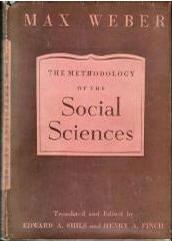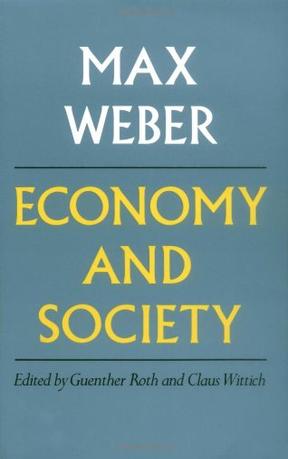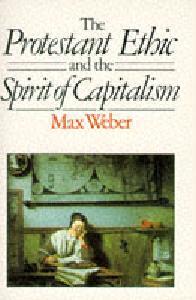欢迎来到相识电子书!
标签:Weber
-
The Protestant Ethic and the Spirit of Capitalism
n The Protestant Ethic, Max Weber opposes the Marxist concept of dialectical materialism and relates the rise of the capitalist economy to the Calvinist belief in the moral value of hard work and the fulfillment of one's worldly duties. Based on the original 1905 edition, this volume includes, along with Weber's treatise, an illuminating introduction, a wealth of explanatory notes, and exemplary responses and remarks-both from Weber and his critics-sparked by publication of The Protestant Ethic and the Spirit of Capitalism. This is the first English translation of the 1905 German text and the first volume to include Weber's unexpurgated responses to his critics, which reveal important developments in and clarifications of Weber's argument. -
Max Weber
Weber's methodological writings form the bedrock of key ideas across the social sciences. His discussion of value freedom and value commitment, causality, understanding and explanation, theory building and ideal types have been of fundamental importance, and their impact remains undiminished today. These ideas influence the current research practice of sociologists, historians, economists and political scientists and are central to debates in the philosophy of social science. But, until now, Weber's extensive writings on methodology have lacked a comprehensive publication. Edited by two of the world's leading Weber scholars, Collected Methodological Writings will provide a completely new, accurate and reliable translation of Weber's extensive output, including previously untranslated letters. Accompanying editorial commentary explains the context of, and interconnections between, all these writings, and additional useful features include a glossary of German terms and an English key, endnotes, bibliography, and person and subject indexes. -
The Religion of China
"The Religion of China: Confucianism and Taoism" (original Free Press edition 1951) is one of a number of works by the German sociologist Max Weber (1864-1920) published in English translation only long after his death, during a post-World-War II boom in Anglo-American interest in his writing. Such interest has recurred at irregular intervals since (one marked by this 1968 paperback reprinting), and Weber's major works, including technical and methodological studies, apparently have all been translated. Initially familiar to readers of English only for his theories on the relation between the Protestant (mainly Calvinist) world-view and the capitalist "rationalization" of economic life ("The Protestant Ethic and the Spirit of Capitalism"), Weber gradually has been revealed as an explorer of the nature of human societies in many times and places. Sinologists have given his studies of China (here and in a few essays published elsewhere) a somewhat mixed reception. On the one hand, it was an important example of China being taken seriously as major civilization, illustrating basic trends in human social behavior, instead of an exotic footnote ("Oriental Despotism," "The Oriental Mode of Production"). A product of Bismarck's Germany, Weber was acutely aware of the effects of bureaucracy, centralization of authority, and economic rationalization on traditional societies, and used China as a test case for his general theories. The religious responses to China's social and political order are a main, but not the only focus, and his treatment of both Confucianism and (mainly philosophical) Taoism as embodying genuine religious experiences was then unusual. Weber's mastery of the available translations and secondary literature is often mentioned as amounting to nearly a professional command of the field. On the other hand, Weber *was* unable to consult the primary sources directly. He was acutely aware that much of his information came from missionaries with ideological biases; according to some, however, he often chose the *wrong* missionary to believe. He seriously underestimated the antiquity of some developments in Chinese government. His examples are sometimes wrong, sometimes not especially pertinent; and better ones are missing because he had no access to them. He accepted the view of Confucius as a sort of learned academic with an interest in ethical government (popular among some modern Chinese as well as westerners), without seeming to notice that he has often been regarded as a supernatural figure, a prophet, or, in Weber's own terms, a "charismatic" leader. And the study of Buddhism in China was in its infancy, and its transformative impacts on Confucian and Taoist thought and practice only beginning to be grasped. The study of the very complex history of Taoism *as a religion* is also mostly a more recent development. Bearing these limits in mind, Weber's study remains fascinating. His suggested interpretations of Chinese society have set the terms for much research attempting to confirm or refute his ideas. He was sometimes wrong about both absolute and relative datings, but he recognized many important trends, and successfully framed them in larger contexts. As very much an amateur in Chinese studies (with greater limits than Weber, and not nearly as industrious, but able to benefit from modern scholarship), I have long found the book illuminating; I just try to check it against recent studies. For those who are familiar with Weber only for "The Protestant Ethic" (and the attendant controversy), this volume, and its companions on "Ancient Judaism" and "The Religions of India," may come as a considerable surprise. Those interested in the sociology of Chinese religion (rather than beliefs and practices) will want to take a look at a book by C.K. Yang, the author of the Introduction to this translation. Yang's "Religion in Chinese Society: A Study of Contemporary Social Functions of Religion and Some of Their Historical Factors" (originally University of California Press, 1961) provides information on Chinese religion in relation to government policies, and community and family structures, with documentation for specific regions. I consider it a complement, not a substitute, for Weber, because several chapters are probably too statistical to make it attractive to many readers. Yang also assumes familiarity with a body of professional sociological thought that Weber was still establishing. Of course, it too is beginning to show its age. -
The Methodology of the Social Sciences
Max Weber,The Methodology of the Social Sciences,edited and translated by Edward A. Shils and Henry A. Finch, with a foreword by Edward Shils,New York:The Free Press,1949. -
Max Weber and Karl Marx (Routledge Sociology Classics)
http://www.questia.com/PM.qst?a=o&d=103888756 -
The Protestant Ethic and the Spirit of Capitalism
在线阅读本书 Max Weber's best-known and most controversial work, The Protestant Ethic and the Spirit of Capitalism, first published in 1904, remains to this day a powerful and fascinating read. Weber's highly accessible style is just one of many reasons for his continuing popularity. The book contends that the Protestant ethic made possible and encouraged the development of capitalism in the West. -
Economy and Society
Economy and Society is a book by political economist and sociologist Max Weber, published posthumously in 1922 by his wife Marianne. Alongside The Protestant Ethic and the Spirit of Capitalism, this is considered to be one of Weber's most important works. Extremely broad in scope, the book covers numerous themes including religion, economics, politics, public administration and sociology. A complete translation of the work was not published in English until 1968.
热门标签
下载排行榜
- 1 梦的解析:最佳译本
- 2 李鸿章全传
- 3 淡定的智慧
- 4 心理操控术
- 5 哈佛口才课
- 6 俗世奇人
- 7 日瓦戈医生
- 8 笑死你的逻辑学
- 9 历史老师没教过的历史
- 10 1分钟和陌生人成为朋友


